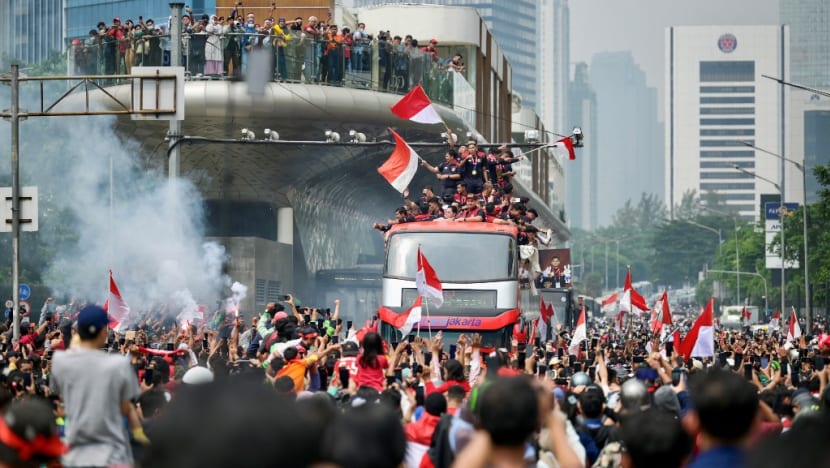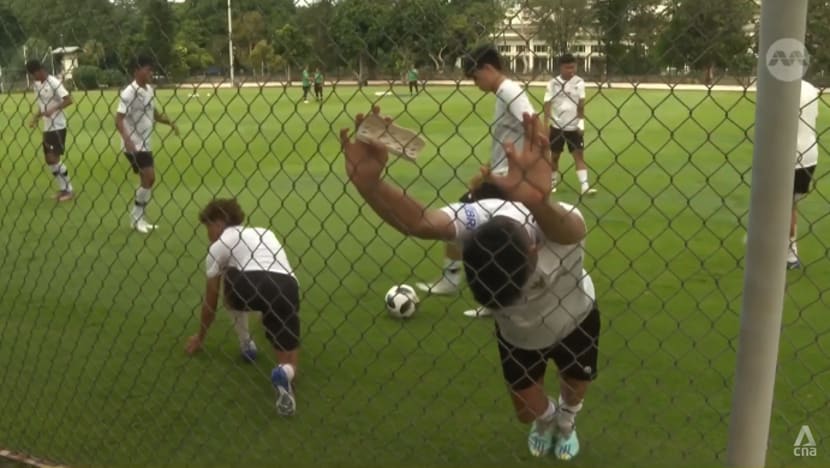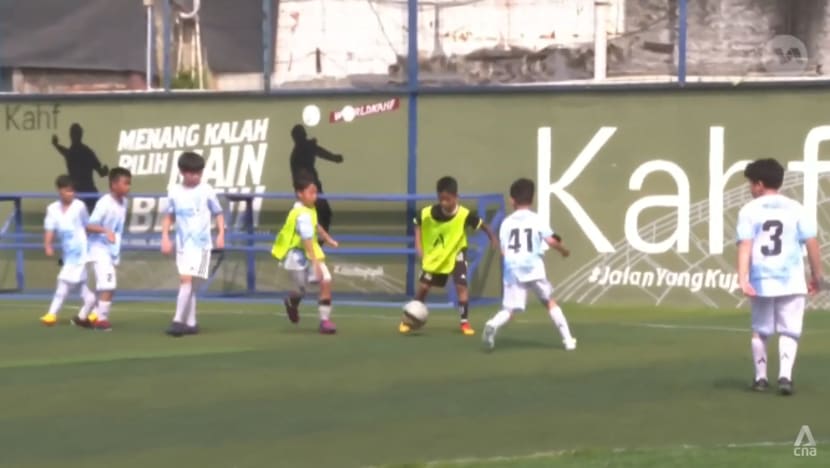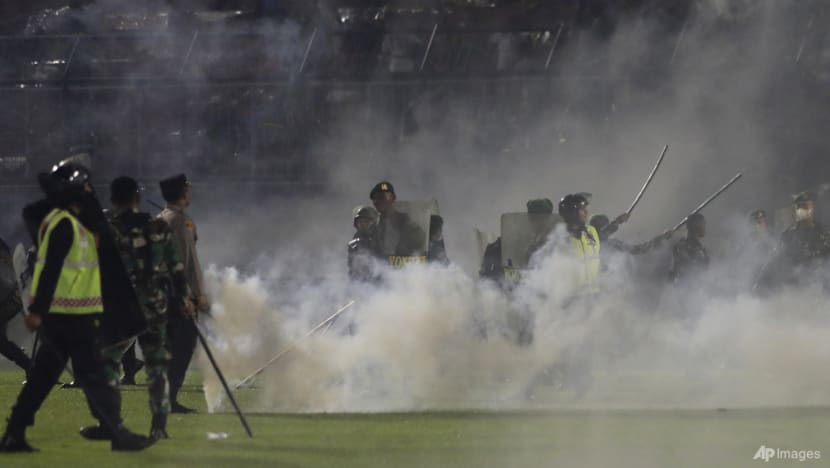Indonesia gears up to kick off FIFA U-17 World Cup amid efforts to reform troubled local football culture
The government is looking to renovate stadiums to FIFA's standards and put in new safeguards to prevent violence from supporters.

JAKARTA: As Indonesia gears up to host the FIFA Under-17 World Cup next month, the country is working to improve its infrastructure and culture surrounding football following last October’s deadly stampede in Kanjuruhan Stadium.
The government is looking to renovate stadiums around the nation to the standards of football’s world governing body FIFA and put in new safeguards to prevent violence from supporters.
The biennial international men's youth football tournament will kick off on Nov 10, and will see 24 nations vying for the cup in matches played in Jakarta, Surabaya, Bandung and Surakarta.
This is the first time Indonesia is hosting a FIFA tournament. It will also be the first time its U-17 squad is playing in the event, having automatically qualified as the host nation.
The national team’s captain Iqbal Gwijangge said the squad is training hard to take on international rivals.
“I'm convinced that I'm qualified to be here. No matter what, I will give my 100 per cent. I will give everything for the Under-17 national team so that at the World Cup, we can compete with the rest of the other countries,” he said.
Indonesia replaced Peru as the organiser of this edition of the event after the South American nation was stripped of its hosting rights as it failed to fulfil its infrastructure commitments.
RISING INTEREST IN FOOTBALL
Football is one of the most popular sports in Indonesia and private football academies have mushroomed in the nation in recent years.
Interest has grown even further following the FIFA World Cup last year, with some local football academies seeing an increase of about 20 per cent in enrolment.

However, observers said more emphasis needs to be given to the development of the sport at the grassroots level.
“We are too focused on the national team without realising you cannot build a house starting with the roof, you have to start with the fundamentals,” said Mr Bernhard Schumm, former coach of the Indonesian national team.
“Long-term thinking, which is what is regularly happening in every European football’s top countries regularly, is not happening here. What we want in 10 years, and we have to start today.”
BOOSTING THE LOCAL SCENE
Clubs like Persija Jakarta, which plays in Liga 1 – Indonesia's top tier professional football league – are leading the way in young talent development with football schools.
“(We have) a football school. The lowest (entry) level is at an early age from primary school, then junior and senior high school and beyond,” said the club's president director Ambono Janurianto.
“After that, we have the academy. The aim of all these is for the players to make it to the main team, to become senior players. This can lead to the growth and transformation of football far better in Indonesia.”

In May, Indonesian football received a boost when the national team took home the gold medal in a dramatic SEA Games final match in Cambodia.
A month later, Indonesia managed to entice World Cup winners Argentina to Jakarta to play a friendly match against the national team.
These are encouraging signs for a country that suffered its worst football tragedy just a year ago.
TROUBLED FOOTBALL HISTORY
On Oct 1 last year, 135 people were killed and hundreds injured during a scramble to flee after police fired tear gas into the stands in Kanjuruhan stadium in Malang, East Java.

The stampede was the worst stadium disaster in Indonesia. It prompted the nation's football governing body to reform the sport.
“We are monitored by FIFA. If there are unwanted incidents, if there is chaos, we will get sanctioned,” said Mr Erick Thohir, chairman of the Football Association of Indonesia (PSSI).
“I hope that the supporters can refrain themselves. Do not harm the clubs, do not harm Indonesia.”
However, even before the incident, the country has had a long, troubled history with the sport. An estimated 90 people have died in football-related incidents, many caused by hooliganism when fans from rival clubs clashed.
REFORMING THE SPORT
Next year, the Indonesian government plans to renovate 22 stadiums as part of reform efforts, at a cost of nearly US$124 million.
Safety measures that have already been put in place include shifting forward the time of matches between rival clubs to the afternoon instead of evening, and barring away fans from games.
It was not a popular decision with supporters and clubs as this means missing the chance to support players at away matches.
“In all the leagues in the world, fans can go to the stadium. They don't have to wait two weeks or longer to see their team play football. It is so important that the players play in front of the fans, because as we know, football is emotion,” said Mr Thomas Doll, the coach of Persija Jakarta.
Despite the safeguards, fans said the violence has not been curbed. Instead, it has shifted elsewhere – online and around neighbourhoods, for instance.
“In the past, verbal abuse was directly exchanged when we met. Now, we are restricted by regulations that prohibit away fans from coming. So, rival supporters do not meet anymore. Now, the verbal abuse is on social media, said Mr Aditya Cahya Gumilang, a Persija Jakarta fan.
“When someone posts an insult on social media, that person is marked. Who is the one who started the provocation? Clashes between fans in the grassroots start from there – they will look for the person who started it, who fuelled the fire,” he added.
MINDSET NEEDS TO CHANGE
Observers said that while infrastructure improvements and stricter rules may cut down on violent incidents, authorities should get to the root of the problem – mindset.
“The transformation (of football) needs to include the culture,” said Mr Kesit Handoyo, a football pundit.
“If the stadium is good, but the spectators still create chaos, it will be useless. No matter how sophisticated the infrastructure is, if the supporters cannot improve their mindset, it will be difficult to make the sport safe.”
Experts said football fanaticism is a deeply-rooted culture in Indonesia and its negative aspects cannot be changed overnight. They urged authorities to start instilling good sporting values in the young.
“People should be trained to not only accept winning but also to accept losing. Good sportsmanship that is nurtured from a young age will stick with the person until adulthood,” Mr Handoyo said.
The U-17 World Cup next month presents a good opportunity for Indonesia to make good on its pledge to reform football and save the game from further disrepute, observers said.




















